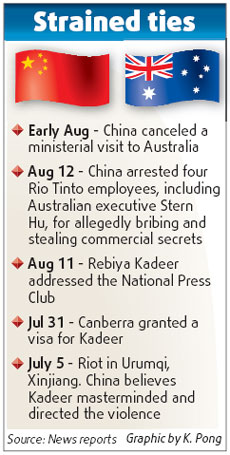Courtesy of Croz Walsh blog an ABC 'Counter Point' interview with Peter Thompson, a former Fiji diplomat, who labeled Australia's smart sanctions on Fiji, as disastrous.
The interview is posted below on MP3 player.

Not surprising that same cumbersome approach in Australian Foreign policy has chilled relations with China, according to Kuwait Times article.
Excerpt of Reuter's article:
UN critical of Australian Aboriginal intervention
By James Grubel
CANBERRA (Reuters) - A senior United Nations official condemned on Thursday Australia's controversial intervention into remote Aboriginal communities, describing the measures as discriminatory and finding entrenched racism in Australia.
The UN Special Rapporteur on Indigenous People, James Anaya, made the findings after a 12-day visit to Australia, where he visited indigenous communities and held talks with the Australian government.
Australia's former conservative government sent police and troops to remote Aboriginal communities in June 2007, and made special bans on alcohol and pornography, to stamp out widespread child sex abuse fueled by chronic alcoholism.
"These measures overtly discriminate against aboriginal peoples, infringe their right of self-determination and stigmatize already stigmatized communities," Anaya told reporters in Canberra. Anaya, the first UN Rapporteur on Indigenous People to visit Aboriginal communities, congratulated Prime Minister Kevin Rudd for his 2008 parliamentary apology to Australia's Aborigines for historical injustices.
But he said it was clear the entrenched racism of the past remained, and the ongoing intervention into communities in the Northern Territory continued to discriminate against Aborigines.
LIFE EXPECTANCY GAP
Rudd has made indigenous affairs a priority of his government and promised to end the 17-year gap in life expectancy between Aborigines and other Australians.
Rudd has said he would continue the controversial intervention, which has widespread support across Australia but has been strongly criticized by some Aboriginal groups.
Anaya's comments will increase the pressure on Rudd to review parts of the intervention, particularly measures that quarantine welfare payments to make sure a proportion of the payments is spent on food, clothing and healthcare.
An independent review last year found the intervention affected 45,500 Aboriginal men, women and children in more than 500 Northern Territory communities, and progress on healthcare and security were undermined by a lack of full community support.
Indigenous Affairs Minister Jenny Macklin said the government was determined to restore laws to outlaw racial discrimination in the Northern Territory and welcomed Anaya's visit.
"I think what's important is that we recognize we have a huge task in front of us to close the gap, to close the life expectancy gap, the employment gap, the gap in education," Macklin told reporters.
"We know how big the task is and we certainly intend to keep getting on with it."
Australia's 460,000 Aborigines make up about 2 percent of the population. They suffer higher rates of unemployment, substance abuse and domestic violence than other Australians.
(Editing by Alex Richardson)














 Zemanta Pixie">
Zemanta Pixie">